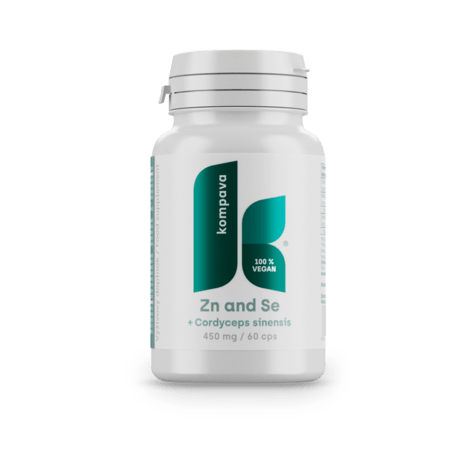Obsah
Cooling down and significant changes in the weather can also prevent the immune system. The first signs of a cold, rhinitis and cough, are caused by the immune system, which responds to the bacteria and viruses that occur. In addition to a balanced diet containing vitamins and minerals, other substances that support your immunity are part of providing adequate protection against viruses. Among them, zinc also plays a major role.
The role of zinc in strengthening the body's immune system and defenses is not negligible. The European Food Information Council points to the importance of adequate zinc intake as a result of its involvement in the production of white blood cells, which protect the body by eradicating viruses and bacteria.
Some research from 2011 even confirmed that the study was milder and the recovery was faster in study participants who included zinc-containing nutritional supplements.
The presence of zinc in sufficient quantities will ensure that the body will be able to respond to, for example, influenza or rhinitis more quickly and reliably, while at the same time contributing to their faster overcoming in a few days.
Did you know that the most common form of transmission of common viruses is through the respiratory tract? That is why a sick sneezing person in our vicinity can easily transmit the virus to us. In this case, the virus particles settle on the mucous membranes, which serve as a suitable substrate for their attachment and subsequent penetration into the rest of the human body.
Zinc can effectively prevent the aforementioned spread of the virus into the body, by giving the virus a significant "stalk" as they try to penetrate. The sites where the virus is associated with the human body are simply occupied sooner, thus significantly reducing the risk of disease.
Other effects of zinc on the human body
Zinc is equally beneficial for women and men. Women will appreciate the ability to affect beauty and youth the most - it increases the quality of hair, nails and skin.
As a powerful antioxidant, it protects against oxidative stress caused by free radicals, thus preventing skin aging.
Fights imperfections and acne. These properties also explain its frequent use as part of creams, ointments, powders or dusting powders used to heal wounds and improve the condition of chronic dry skin.
In men, it has a positive effect on the functioning of the reproductive system and testosterone levels.
Foods containing Zn
- Fish, seafood (oysters are a rich source - 7.6 mg Zn / 100g oysters);
- Meat (especially red meat, up to 4.8 mg Zn / 100 g beef);
- Eggs;
- Legumes (lentils, chickpeas, beans);
- Seeds (pumpkin, sesame, hemp seeds);
- Nuts (almonds, cashews, peanuts);
- Milk and products from milk (3 mg Zn / 100 g Cheddar cheese);
- Vegetables (potatoes, spinach, cabbage, broccoli, garlic);
- Chocolate.
The best way to ensure a sufficient intake of zinc is, of course, a balanced and healthy diet. Zinc in the form of animal products is the best usable for the human body, so vegetarians and vegans are often at risk of a deficiency.
As it is a mineral that the human body is not able to produce on its own, in periods that represent a burden on the immune system, it is appropriate to reach for zinc in the form of nutritional supplements containing it.
What is the best form of zinc for us?
Zinc, like other minerals, occurs in various forms. They differ in the content of elemental zinc, but the most significant difference is its different absorption.
Inorganic form of zinc
It is used quite often due to the low price. However, the absorption is around 10%, which is very little to be usable and effective for the human body. Therefore, if you are looking for an effective nutritional supplement, the inorganic form of zinc should definitely not be your choice. The most common representative of this form is zinc oxide.
Zinc oxide should be avoided in particular by the elderly, whose stomach acid is weaker, or by people taking medication to reduce stomach acidity, as they have even lower zinc absorption and a substantial part of it is eliminated without any use.
Organic form of zinc
In this case, zinc is bound to an organic acid. It is a form that is significantly better absorbed and thus can better fulfill its purpose. A known organic form is, for example, zinc citrate, which is characterized by good absorption.
Also included is zinc lactate, which is a stable organic salt of zinc, characterized in particular by good water solubility and easy absorption. It is often used in nutritional supplements to supplement zinc in the human body, as this form is much more effective compared to inorganic forms due to its excellent absorption without the burden of digestion.
Recommended daily dose
The recommended daily intake of zinc is approximately 10 mg. However, this value is only indicative, as the need for elemental zinc is individual and at the same time depends on a number of factors.
Who can suffer from zinc deficiency?
- Pregnant women, as part of the zinc is taken from the fetus by the umbilical cord and subsequently after birth by breast milk. In this case, it is important to ensure an adequate intake of zinc, as its deficiency can also affect the health of children - for example, slow growth or the risk of acrodermatitis (inflammation of the skin on the limbs);
- Alcoholics, as alcohol irritates the digestive system and reduces the absorption of nutrients from the diet;
- Athletes who sweat during strenuous physical activity and lose more minerals, including about 1 mg zinc / 1 liter sweat;
- Vegetarians who do not care to ensure a sufficient balance of diet;
- People suffering from various diseases of the digestive tract - for example, diarrhea, Crohn's disease, anorexia or celiac disease, as inflammatory processes in the body result in lower absorption of nutrients;
- Cancer patients;
- AIDS;
- Sexually active men - ejaculate is very rich in zinc, the reduction of which often leads to a decrease in libido and the risk of infertility.
How does zinc deficiency manifest itself?
Zinc deficiency is easily detectable mainly through susceptibility to various inflammatory processes, weakened immunity, loss of appetite associated with subsequent weight loss, deterioration of nail or hair quality.
Long-term low levels of this mineral in the body can cause serious health complications. These include, for example:
- Fatigue and muscle weakness;
- Loss of appetite or, conversely, an increase in appetite for sweets;
- Blood clotting disorders;
- Anemia;
- Poor wound healing;
- Increased susceptibility to various fungal infections;
- Rash and skin irritation;
- Eyes, smell and taste disorders;
- Ovulation disorders in women and infertility in men.
______________________________________________________________________________________________________________________________________________________
RESOURCES:
https://pubmed.ncbi.nlm.nih.gov/9701160/


